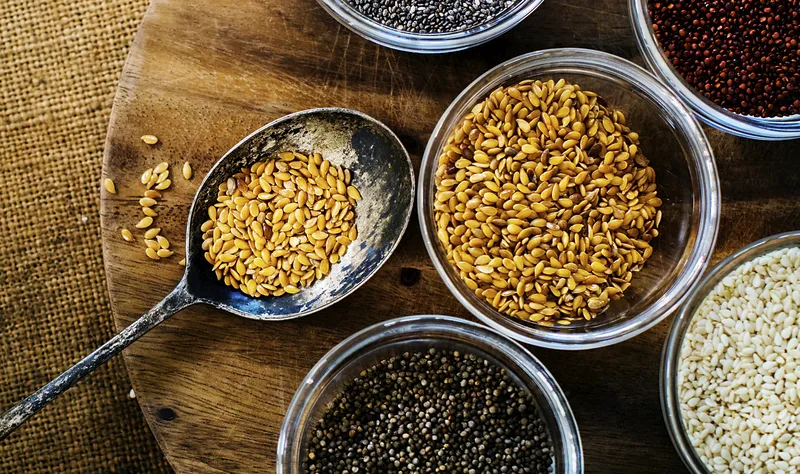A Guide to the Health Benefits of Flax Seeds vs Oil
 There seems to be a lot of talk out there between flax seeds vs oil. Both have become increasingly popular in recent years, due to their many health benefits. Both are packed with essential fatty acids, which can help reduce inflammation. But what is the difference between these two products?
There seems to be a lot of talk out there between flax seeds vs oil. Both have become increasingly popular in recent years, due to their many health benefits. Both are packed with essential fatty acids, which can help reduce inflammation. But what is the difference between these two products?
In this guide, we’ll explore flax seeds vs oil, how each can benefit your health and how they differ.
Flax seeds are an incredibly nutrient-dense source of beneficial fats, minerals and vitamins that can help improve overall well-being.
What is Flax seed?
Flax seeds are a “wholefood.” The small seeds come from the flowering plant Linum usitatissimum. They are one of the oldest crops in history and have been used for thousands of years for medicinal purposes.

Skoch3 at en.wikipedia, CC BY-SA 3.0, via Wikimedia Commons
Flax seed, also known as linseeds, are a small, flat seed that come from the flax plant. It can be consumed in either ground or whole form, and is often used as an ingredient in salads, smoothies, breads, granola bars, yogurt, breakfast cereals, oatmeal, muffins or cookies. As for taste, they have a unique nutty flavor.
Unlike other vegetable oils, such as olive or canola oil which contain mostly monounsaturated fats and polyunsaturated fats respectively; flax seed oil contains a higher proportion of polyunsaturated fats which makes it a much healthier option than other vegetable oils.
Flax seed oil can be used in place of butter on toast or added to salad dressings or smoothies for added flavor and nutrition.
Types of Flax Seeds
Interestingly, there are different types of flax seeds – white, golden and brown being the most popular.
- White flax seeds are the smallest and mildest in taste
- Golden flax seeds have a stronger nutty flavor
- Brown flax is the most commonly used variety with its rich colour and powerful aroma when roasted
Flax seeds are rich in beneficial nutrients such as omega-3 fatty acids, dietary fiber, lignans (phytoestrogens), vitamins B1 and B6, potassium, magnesium, phosphorus, selenium, iron, zinc, manganese and copper. They also contain protein and carbohydrates.

What are lignans?
Lignans are a type of natural dietary fiber found in certain foods like whole grains, certain fruits and vegetables, flax seed, sesame seed and other plant-based products. They’re important because they act as antioxidants that protect our bodies against oxidative stress from things like air pollution and secondhand smoke.
They can also play a role in improving cardiovascular health, keeping hormones in balance, supporting overall well being and even reducing the risk of some cancers. So, not only can lignans be great for your health, but they’re also readily available too! Adding more lignans to your diet is a simple way to give your body an extra boost of nutrition.
Benefits of Flax Seeds vs Flax Seed Oil
The omega-3 fatty acids found in flax seeds can help reduce inflammation throughout the body. This can be beneficial for those who suffer from chronic inflammatory conditions such as arthritis or asthma.
Additionally, research has shown that flax seeds may be beneficial for heart health by lowering cholesterol levels.
Fiber content helps promote regularity while lignans may play a role in reducing cancer risk by blocking certain hormones associated with tumor growth.
Furthermore, studies suggest that regularly consuming flax seed may reduce hot flashes in menopausal women.
What is the importance of Omega-3 fatty acids?
Omega-3 fatty acids play an incredibly important role in our health, particularly in brain and heart health. These fatty acids are not naturally produced by our bodies, so it is essential that we get them through diet or supplementation.
Omega-3s have been shown to reduce inflammation, keep blood pressure under control, lower risk of chronic diseases and dementia, aid eye health, as well as reduce depression and anxiety.
If you want to make sure you are getting the right amount of Omega-3s into your diet then it would be wise to add more fish, walnuts, flax seed oil and other sources high in these fats, such as chia seeds.
The importance of Omega-3 fatty acids cannot be underestimated – they have so many incredible benefits for us! It’s well worth investing both time and money into including them into your daily routine.
What is Flax Seed Oil?
Flax seed oil is made by pressing raw flax seeds to extract their oils. Unlike whole flax seeds, which must be freshly ground to release their nutrients; flax seed oil is much more nutritious since its nutrients are already available for absorption by the body.
The presence of alpha-linolenic acid (ALA) makes it an excellent source of omega-3 fatty acids, which have numerous benefits such as reducing inflammation throughout the body, as well as promoting heart health by reducing cholesterol levels.
Additionally, due to its antioxidant content; regular consumption of flax seed oil may offer protection against some forms of cancer as well as improving skin health due to its anti-inflammatory properties.
So, Flax seeds vs Flax seed Oil… What’s the difference?
Whole flax seeds provide more dietary fiber than the oil does. And fiber is very important to your health — and most of us don’t get enough from our diets.
The oil offers more Omega-3 fatty acids and antioxidants than its whole counterpart.
Whichever you choose, flax seed or flax seed oil, those looking to improve their overall wellness through better nutrition choices won’t go wrong with either.
Things to know before purchasing the oil
Flax seed oil is one of nature’s most amazing healing oils and should be purchased with care.
When flax seed oil is cold pressed, it has a longer shelf life and preserves all the beneficial fatty acids and antioxidants within. Moreover, flax seed oil which is not cold-pressed will have much less healthy value because a lot of the essential elements are destroyed by the heat produced during production.
Additionally, flax seed oil should always be bottled with care to ensure utmost safety and effectiveness. This means selecting an optimal bottle size for whatever usage you plan on having with flax seed oil so that it lasts a long time before needing to be re-purchased or expire on your shelves.
It must also be stored in a tightly sealed container specifically for flax seed oil products to make sure none of its benefits are lost over time.
Taking these steps into account can help ensure you get the most out of your flax seed oil purchase!
Recommended Dosage & Storage
How much flax seed oil is recommended?
Adding flax seed oil to your daily routine is simple; it comes in liquid or capsule form so you can choose whichever is best for you.
Just take the recommended dosage either first thing in the morning or shortly before bed and be sure to get a pharmaceutical-grade flax seed oil that’s been cold pressed to retain maximum nutritional value!
How much flax seeds are recommended?
Its daily recommended dosage varies, depending on the type and amount of flax seed oil you choose to use. As a general guideline, it is recommended to intake three to four tablespoons of flax seed oil each day for optimal health benefits
Storage
Keeping flax seeds or flax seed oil at room temperature can create many dilemmas.
If the flax seed oil is left unrefrigerated, it could become rancid over time due to exposure to light and heat.
On the flip side, refrigerating flax seeds or flax seed oil can cause it to become thick and harden – making it difficult to use.
So what’s the right answer? Experts disagree.
Some say flaxseed oil must be refrigerated after being opened. (I refrigerate mine.)
Others say the best solution for storing flax seeds or flax seed oil is a cool, dark place like a cupboard or pantry, away from any direct sunlight once opened. For optimal shelf life, transfer smaller amounts into a dark colored glass bottle so exposure to air and light can be minimized.
Look for cold-pressed oil that is sealed inside an opaque bottle to keep the light out.
Conclusion:
Flax seed and flax seed oil both offer tremendous health benefits due their high concentration of essential fatty acids such as omega-3 fatty acids ALA which offers anti-inflammatory effects throughout the body while also providing numerous other nutrients such as fiber and lignans that further contribute towards overall well-being.
Ultimately it all comes down to personal preference; if you’re looking for a nutrient dense product then go for ground up whole seeds or better yet consider using an extractor machine so you get maximum nutrition from your food sources! However if you’re looking for a quick fix then opt for quality cold pressed organic oils instead! Whichever you choose make sure it fits your lifestyle needs first before investing into it!
